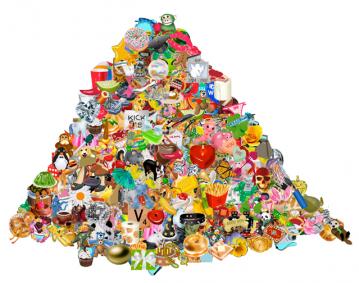快公司:各大品牌开发虚拟商品旨在加强顾客联系
上星期,《纽约时代》周刊报导Volvo、H&M和MTV Networks等知名品牌公司开始进军虚拟商品市场。虚拟商品是指人们在网络社区或游戏中购买的非实体产品。这类商品一般花费1至2美元,主要包括虚拟鲜花或FarmVille等社交游戏道具等。
近期,一些品牌公司希望通过销售虚拟商品保持与顾客的紧密联系,同时也希望凭此提高40岁以下人群的品牌消费额。基于上述的好处,我们并不惊奇各大品牌对虚拟商品的浓厚兴趣。同时,业内分析家也指出,虚拟商品市场具有广阔的市场前景,预计于今天将有可能突破20亿产值。
进军虚拟商品市场是目前各大品牌应对现实挑战的一种方法,即如何使品牌更加贴近顾客,如何使品牌更受欢迎。
然而发售虚拟商品无法解决根本问题。激情是促使玩家心甘情愿将金钱花费在社交网络上的根本动力。如果品牌公司仅仅注重虚拟商品的销售业绩是无法确保顾客的情感联系的,而这却是促进品牌长期发展的关键因素。
为了达到预期目标,各大品牌必须清楚自己的首要任务?仅仅是为追求顾客的消费额?又或者是真的重视顾客群体,想要建立长期的合作关系?
目前,各大品牌实现后者的最有力的方式就是实现价值观的分享。这也是许多强调品牌核心价值观的虚拟产品成为促进顾客群体情感联系最有效方式的根本原因。前一段时间,Zynga公司通过虚拟商品为主海地地震受害者就是一个成功的例子。
因此,品牌在冒然进入社交游戏领域前最好预先熟悉社交媒介的运作规则。如果某一品牌只注重追逐利益,那么该品牌很快就会明白玩家并不买他的帐。然而,如果可以将动机透明化,同时联合广告代理,加强塑造品牌和顾客的情感联系,社交游戏新潮流就有可能为品牌公司带来丰厚的利润。
那么您是否赞成品牌公司销售虚拟产品?或者您认为品牌无法从社交游戏领域得到预期的发展?
As The New York Times reported last week, brands such as Volvo, H&M, and MTV Networks are entering the virtual goods market. Virtual goods are non-physical products that people buy for use in online communities or games. They usually cost a dollar or two and might be a gift like a bouquet of flowers or an item that people can purchase in games like Farmville that give players an edge over their competitors.
Brands hope to use virtual goods to keep in touch with their consumers and also use the goods to soak up any discretionary spending especially among the Web-savvy under-40 crowd. The reason for their interest is not surprising. Analysts agree that the virtual goods market will be worth over $2 billion this year.
This is just one way that brands are responding to a very real challenge–how to make themselves relevant, sharable, and likable within the social ecosystem.
Yet launching virtual goods is only half a solution. The currency that people trade across social networks in not money but emotion. As such, merely selling virtual goods will do little to achieve the emotional connection that brands need over the long term.
For that to happen, brands must ask themselves what is their priority? Are they merely after another slice of the consumer pocketbook? Or are they genuinely interested in the community and want to build it over the long term?
The most powerful way for brands to do the latter is through shared values. That is why virtual goods connected to a cause or initiative that reinforces the core values of a brand is great marketing and an effective way to forge an emotional connection with a community. A good example is how game-maker Zynga recently used virtual goods to aid victims of the earthquake in Haiti.
Brands would be wise to consider the rules of social media engagement before treating social games as a gold rush. If they are only interested in profit, brands will quickly learn that gamers don’t play by their rules. But if their motives are transparent and their ad agencies help them to connect emotionally, this new trend could be incredibly beneficial for themselves, their community and the well being of others.
Do you think brands should start selling virtual goods? Or do you think that will ruin their experience within social games? (Source:Fastcompany)









































